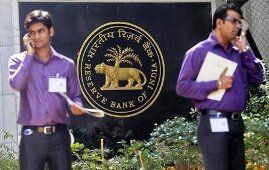 Faced with a weakening rupee, the Reserve Bank of India on Thursday announced it will sell government bonds worth Rs 22,000 crore (Rs 220 billion) every Monday to check volatility in the forex market.
Faced with a weakening rupee, the Reserve Bank of India on Thursday announced it will sell government bonds worth Rs 22,000 crore (Rs 220 billion) every Monday to check volatility in the forex market.
The measure is a part of a continuing effort to arrest the slide in the rupee, which hit a record intra-day low of Rs 61.80 against the dollar on Tuesday.
"Over the last two months, the RBI has instituted several measures to contain the volatility in the foreign exchange market," the central bank said in a statement.
"On a review of the impact of these measures and for effective liquidity management, it has been decided that the RBI will auction Government of India Cash Management Bills for a notified amount of Rs 22,000 crore (Rs 220 billion) once every week on Mondays," it said.
The duration of the auction will be announced one day prior to the date of auction, it added.
The rupee on Thursday recovered from an all-time closing low, adding 42 paise to end at 60.88 against the dollar.
On Wednesday, the rupee closed at 61.30 against
The decline of the rupee to the previous record intra-day low of 61.21 against the dollar on July 8 forced the RBI to take a series of unconventional measures to curtail liquidity and curb speculation.
On July 15, the Reserve Bank put in place measures to restore stability in the foreign exchange market, including raising the Marginal Standing Facility and bank rates to 10.25 per cent and restricting access by way of repo window to Rs 75,000 crore (Rs 750 billion).
The central bank also conducted open market sales of government securities of Rs 2,500 crore (Rs 25 billion) on July 18.
As a contingency measure, it opened a dedicated special repo window for a notified amount of Rs 25,000 crore (Rs 250 billion) for liquidity support to mutual funds that face redemption pressure.
On July 22, the RBI rationalised gold imports by making it mandatory on all nominated banks to ensure that at least one-fifth of the imported metal is exclusively made available for exports.
A day later, the RBI directed banks to draw only 50 per cent of their total deposits in overnight borrowings and maintain a 99 per cent average cash reserve ratio everyday.








